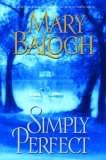
I love when authors write in series and have old characters weave into new stories. I feel like I'm coming upon old friends, and it deepens my appreciation for those characters. I will fully admit that I don't always remember everyone -- I'm terrible with names and faces in real life, so some details are always lost to the fog -- but I remember enough to feel fond and enjoy meeting everyone again.
Simply Perfect lends itself to this sort of reunion nostalgia, because as the headmistress of the girl's school, Miss Martin has a perfect excuse to further her friendships with her former (is there another F word I can think of? No? Shame) teachers. And since her school's story is inextricably linked to that of the Bedwyns -- in particular her erstwhile charge, the incorrigible Miss Freyja Bedwyn as was, and her employer at that time, Wulfric the duke -- she rubs shoulders with all the Bedwyn crew as well, despite her reservations about doing so.
This, of course, is where romance novels, particularly series, can fall into absurdity. Almost every one of her friends has made an advantageous match with a noble, and this plain schoolmistress finds herself neck deep in titles as she spends a summer out in the country with her charity girls, enjoying aristrocratic hospitality. Balogh acknowledges the humor in the situation by having Claudia herself continually refer to the unlikelihood.
But to the love bits: Claudia's match is with Joseph, Marquess of Attingsborough and heir to a dukedom, a delicious tidbit in that she particularly despises dukes. Much of the novel he pursues his family's socially acceptable choice for him in an unromantic but fully understandable manner. I don't buy heroes and heroines from other cultures who flout their society's expectations without a second thought, so it made sense to me that it would take so many gradual degrees to move each of them into admitting and accepting their love for each other -- and then working to overcome the obstacles in their way. The same applies to how Joseph works out his situation with his blind, illegitimate daughter, figuring out how to truly care for a person society would have, for two reasons, put far away from public notice.
Whether everything works out in the end -- well, I'll leave you in suspense. You'll have to read the book!
And, yes, I see that it's been two months since I last read anything fun like this. Eep! Even writing this post was interrupted by a certain 15-month-old.
That reminds me that, when I was reading, I kept critiquing some of the parenting in the book with the daughter! I wanted them to stop saying "good job" to her, as if they could have read Alfie Kohn or somehow intuited his ideas! Oh, well.
It does make me think, as a writer, how much indirect influence you can have on readers. I do find myself in my own writing wanting to put in elements of my life and philosophies that are important to me. In writing historical fiction, of course, you always have to keep it plausible, though. I want my heroines to matter-of-factly breastfeed, for instance, but I know wet nursing was very common in the nineteenth century, so you almost have to make a point of saying how unconventional your heroine is for doing so.
Food for thought: How have you as a reader enjoyed or deplored "lessons" you felt novels were giving you? How have you as a writer tried to insert your own social agenda into your fiction writing?




